
Lundu (also spelled landu or landum) is a style of Afro-Brazilian music and dance [1] with its origins in the African Bantu and Portuguese people.

Lundu (also spelled landu or landum) is a style of Afro-Brazilian music and dance [1] with its origins in the African Bantu and Portuguese people.
The interconnectedness of Lusophone countries dates back to the Atlantic Slave Trade, between Portugal, Brazil and regions of Africa. [2] In the 15th century, the Portuguese were the primary exporters of African slaves to the Americas, and with slaves came their musical traditions. [3] Throughout the 17th and 18th centuries, there was a massive Brazilian presence in Angola, enabling a cultural exchange between the two Portuguese colonies. [4] This exchange enabled subtle amalgamations of musical styles between Angola, Brazil and other African slave trade countries. [5] The establishment of a creole population in Brazil led to further cultural developments in language, religion and art. [6] In 1859, French journalist Charles Ribeyrolles described Afro-Brazilian free practices on a fazenda in Rio de Janeiro province:
Saturday evening, after the last working task of the week, and on holidays that give idleness and rest, the blacks have an hour or two of the evening for dancing. They assemble in their terreiro , calling, gathering and inciting each other, and the celebration starts. Here it is the capoeira , a kind of Pyrrhic dance, with daring combat evolutions, regulated by the Congo drum; there it is the batuque , with its cold or indecent postures which the urucungo , viola with thin cords, accelerates or contains; further away it is a frenzied dance where the gaze, the breasts and the hips provoke. It is a kind of inebriated convulsion one calls the lundu. [7]
Records from the inquisition of the 18th century reveal that the Europeans initially considered gandus and lundus to be witchcraft. [8] Many slave-owning Europeans in Brazil tolerated the dance in an attempt to avoid slave rebellion. [9] Eventually, the style became attractive to Europeans in Brazil for its sexualized quality and its believed effectiveness in reversing witchcraft. [10] de Mattos was disgruntled by the blurring by dance and drums of strict racial and cultural boundaries in Brazil. [11]
Gradually, the lundu style grew in popularity among the elite population in Brazil. [12] In 1749, Brazilian musician Manuel de Almeida Botelho immigrated to Lisbon, bringing with him the modinha and lundu musical styles. [13] By the 19th century, lundu had become the music of choice for the Luso-Brazilian bourgeoisie. [14] Historians have even called the style the “…most characteristic late 18th century [genre] of dance and song in Portugal and Brazil”. [15]

Lundus are characterized by varying structure, the interplay of tonic and dominant harmony, and strummed chords layered atop a syncopated rhythm reminiscent of traditional West African music. [16] Limited recordings are available of traditional lundus style. Usually a flirtatious ritual of a couple dance, accompanied by a guitar, or sometimes a thumb piano or drums, Lundu is related to the Spanish fandango and other new-world dances like the Argentine Zamba, the Peruvian Zamacueca and the Cuban Bolero - they all involve, to some degree, handkerchiefs, castanets, and holding one's arms above one's head. In the 19th century, the lundu was one of the sources of the Choro, the Maxixe and the Samba.

Capoeira is a Afro-Brazilian martial art and game that includes elements of dance, acrobatics, music and spirituality.

Samba is a lively dance of Afro-Brazilian origin in 2/4(2 by 4) time danced to samba music.

The berimbau is a traditional Angolan musical bow that is commonly used in Brazil. It is also known as sekitulege among the Baganda and Busoga.
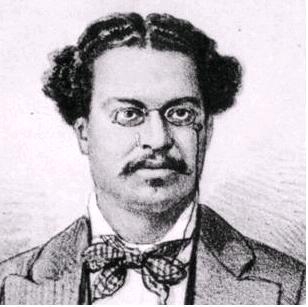
Choro, also popularly called chorinho, is an instrumental Brazilian popular music genre which originated in 19th century Rio de Janeiro. Despite its name, the music often has a fast and happy rhythm. It is characterized by virtuosity, improvisation and subtle modulations, and is full of syncopation and counterpoint. Choro is considered the first characteristically Brazilian genre of urban popular music. The serenaders who play choros are known as chorões.
Afro–Latin Americans or Black Latin Americans are Latin Americans of sub-Saharan African heritage. African heritage is common throughout Latin America.

Afro-Brazilians are an ethno-racial group consisting of Brazilians with predominantly or total Sub-Saharan African ancestry, these stand out for having dark skin. Most multiracial Brazilians also have a range of degree of African ancestry. Brazilians whose African features are more evident are generally seen by others as Blacks and may identify themselves as such, while the ones with less noticeable African features may not be seen as such. However, Brazilians rarely use the term "Afro-Brazilian" as a term of ethnic identity and never in informal discourse.

Capoeira music is the traditional musical accompaniment used in Afro-Brazilian art capoeira, featuring instruments like berimbau, pandeiro, atabaque, agogô, and reco-reco. The music plays a crucial role in capoeira roda, setting the style the energy of a game.
Afro-Caribbean music is a broad term for music styles originating in the Caribbean from the African diaspora. These types of music usually have West African/Central African influence because of the presence and history of African people and their descendants living in the Caribbean, as a result of the trans-Atlantic slave trade. These distinctive musical art forms came about from the cultural mingling of African, Indigenous, and European inhabitants. Characteristically, Afro-Caribbean music incorporates components, instruments and influences from a variety of African cultures, as well as Indigenous and European cultures.
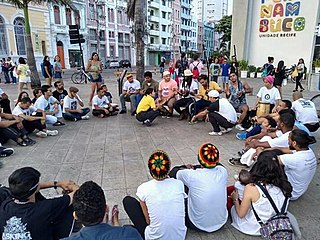
Capoeira de Angola or simply angola is the traditional style of capoeira, the Afro-Brazilian martial art. A newer style, based on the reform of capoeira Angola, is called regional.
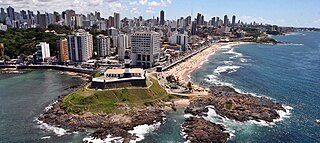
Salvador is a Brazilian municipality and capital city of the state of Bahia. Situated in the Zona da Mata in the Northeast Region of Brazil, Salvador is recognized throughout the country and internationally for its cuisine, music, and architecture. The African influence in many cultural aspects of the city makes it a center of Afro-Brazilian culture. As the first capital of Colonial Brazil, the city is one of the oldest in the Americas. Its foundation in 1549 by Tomé de Sousa took place on account of the implementation of the General Government of Brazil by the Portuguese Empire.
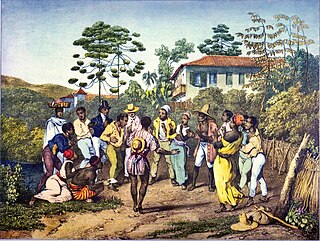
Batuque (drumming) was a general term for various Afro-Brazilian practices in the 19th century, including music, dance, combat game and religion.

Angola–Brazil relations are the bilateral relations between Angola and Brazil. As former Portuguese colonies, Angola and Brazil share many cultural ties, including language and religion. Both nations are members of the Community of Portuguese Language Countries, Group of 77 and the United Nations.
N'golo is a traditional Bantu martial art and game from Angola, that combines elements of combat and dance, performed in a circle accompanied by music and singing. It is known as the forerunner of capoeira.
Music of African heritage in Cuba derives from the musical traditions of the many ethnic groups from different parts of West and Central Africa that were brought to Cuba as slaves between the 16th and 19th centuries. Members of some of these groups formed their own ethnic associations or cabildos, in which cultural traditions were conserved, including musical ones. Music of African heritage, along with considerable Iberian (Spanish) musical elements, forms the fulcrum of Cuban music.
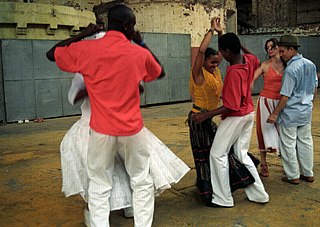
Umbigada, sometimes translates as "belly bump" or "belly blow", is a dance move in various Afro-Brazilian dances. It is seen as a "basic feature of many dances imported to Brazil and Portugal from the Congo-Angola region", for example, samba, fandango, batuque, creole drum.
The word Nagos refers to all Brazilian Yoruba people, their African descendants, Yoruba myth, ritual, and cosmological patterns. Nagos derives from the word anago, a term Fon-speaking people used to describe Yoruba-speaking people from the kingdom of Ketu, Toward the end of the slave trade in the 1880s, the Nagos stood out as the African group most often shipped to Brazil. The Nagos were important to the history of the slave trade at that time in the 19th century, as Brazil requested more enslaved persons as demand for products from this region grew and harsh conditions on plantations entailed a high turnover.

The Kalunga Project was a project initiated by the Angolan government to reconnect with those of the diaspora within Brazil. This tour was not only political but also a social commentary connecting Brazil and Angola through music as well as through pop-culture. Brazilian performers were invited to tour Angola, performing as an act of solidarity to the communist party during the Angolan Civil War. The tour took place in the cities Luanda, Lobito, and Benguela. All of the more than 60 performers and artists supported the MPLA in their fight for independence; many singing about anti-colonial struggles through Semba.
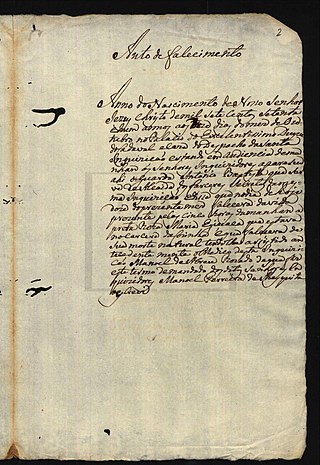
Rosa Egipcíaca, also known as Rosa Maria Egipcíaca of Vera Cruz and Rosa Courana, was a formerly enslaved writer and religious mystic, who was the author of A Sagrada Teologia do Amor de Deus Luz Brilhante das Almas Peregrinas – the oldest book written by a black woman in the history of Brazil.

Afro-Brazilian music consists of a mixture of musical and cultural influences from Sub-Saharan Africa, Portugal, and on a smaller scale, Amerindian music, creating a large variety of styles. Lyrics, instruments, and even melodies often have connections to African culture and even influence culture and music in other countries today. It is strongly influenced by African rhythms. The most well known sub-genres of Afro-Brazilian musical genres are samba, marabaixo, maracatu, ijexá, coco, jongo, carimbó, lambada, maxixe, and maculelê.
Russell G. Hamilton was an American author specialised in history and literature. He was a professor emeritus of Spanish and Portuguese and first African-American to serve as a dean at Vanderbilt University in Nashville, Tennessee. He is the author of Voices from an Empire, a History of Afro-Portuguese Literature which was first published in 1975 and Literatura Africana, Literatura Necessária.